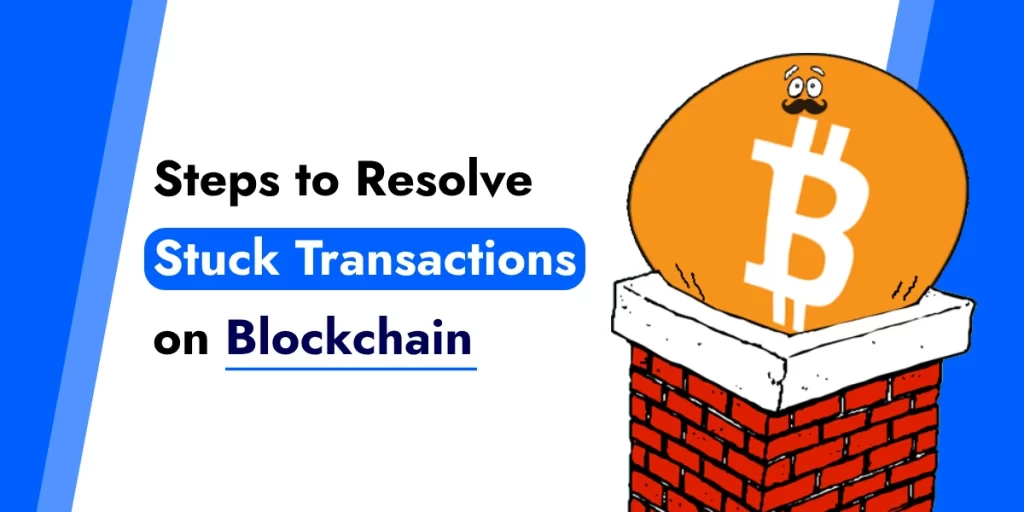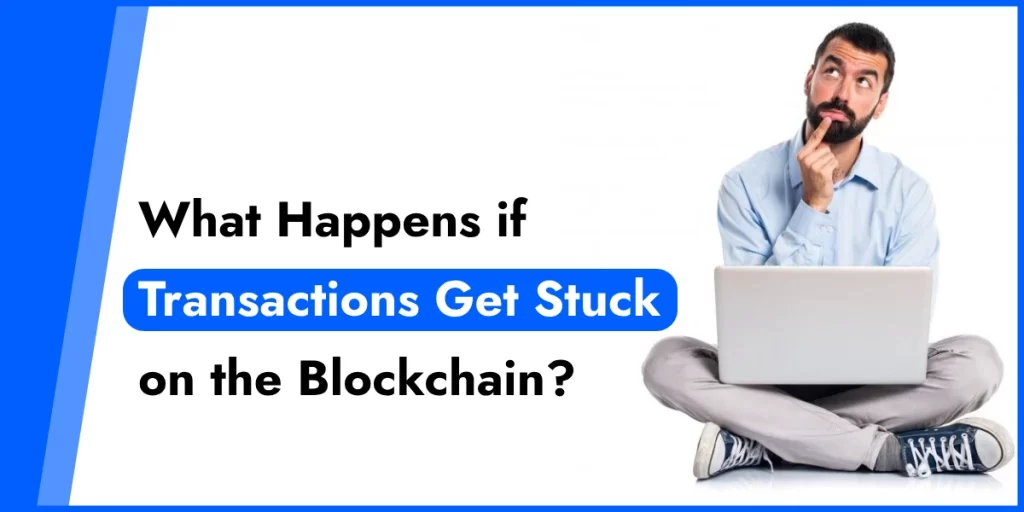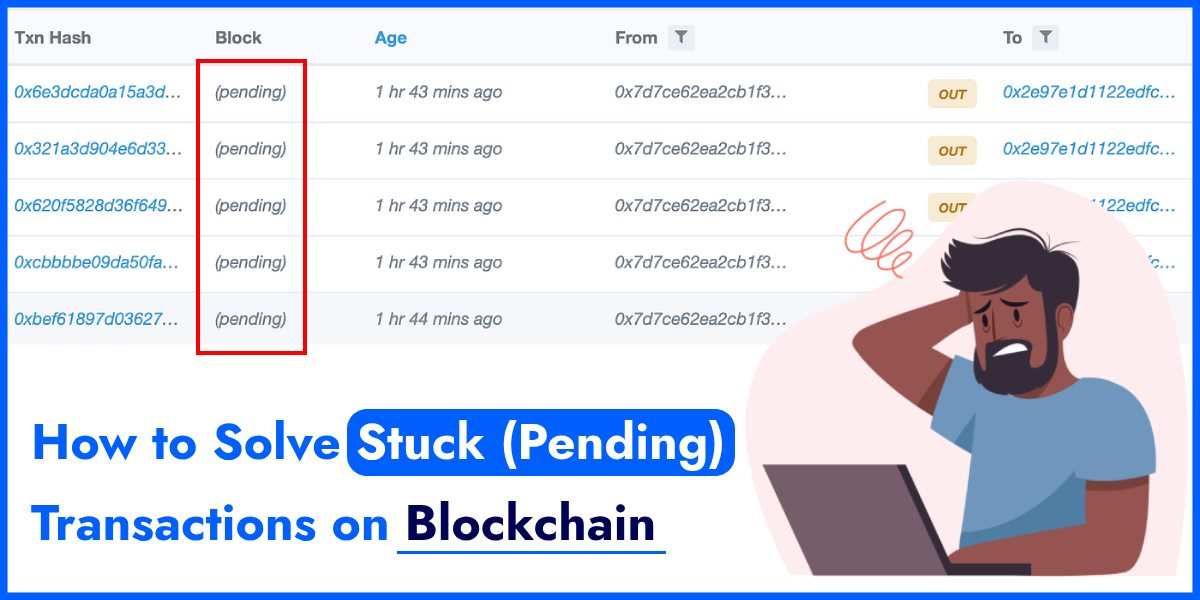Stuck or pending transactions can be a frustrating experience for users of blockchain networks. Whether you’re dealing with Bitcoin, Ethereum, or any other blockchain, it’s essential to know how to resolve this issue. In this guide, we’ll provide you with effective solutions to get your transactions moving.
Major Reasons, Why Blockchain Transactions Are Stuck (Pending)?
Transactions stuck or remain pending on a blockchain due to various reasons:
- Network Congestion:
High transaction volumes can lead to delays in processing. This is common during times of heavy network activity.
- Insufficient Gas Fees:
In networks like Ethereum, due to insufficient gas fees may miners ignore the transactions. Adjusting the fee can help accelerate confirmation.
- Nonce Issues:
Transactions have a nonce, which ensures they are in the order to process. If a transaction with a lower nonce is stuck, it can prevent subsequent transactions from being confirmed. Clearing the nonce is a potential solution.
- Low Priority Transactions:
Some networks have priority mechanisms. Low-priority transactions might be delayed in favor of higher-priority ones, especially in congested periods.
- Incorrectly Set Gas Limits:
If the gas limit is set too low, it might not provide enough incentive for miners to include the transaction in a block.
- Blockchain Forks or Reorganizations:
Temporary forks or reorganizations in the blockchain can cause transactions to appear pending until the situation stabilizes.
- Issues with the Wallet or Exchange:
Problems with the wallet or exchange platform can prevent transactions from being broadcasted or processed properly.
- Smart Contract Errors:
If a transaction involves a smart contract, errors within the contract code can prevent confirmation.
By identifying the specific cause, users can take appropriate steps to resolve pending transactions and ensure smoother operations on the blockchain.
Also Know:- Blockchain.com Support Not Responding – What To Do?
Steps to Resolve Stuck Transactions on Blockchain

Verify the Transaction Status
Before taking any action, confirm that the transaction is indeed pending. Use a reputable block explorer like Etherscan for Ethereum transactions or a similar tool for other blockchains to check the status.
Wait Patiently
Sometimes, the network might be congested, causing delays. The best course of action might be to wait for the network to clear up and process your transaction naturally.
Adjust Gas Fees
For Ethereum transactions, adjusting the gas fees can sometimes push a transaction through. Be cautious when doing this, as setting fees too low could result in another stuck transaction.
Resubmit the Transaction
If your wallet or exchange allows, try resubmitting the transaction. Make sure to include an appropriate gas fee to incentivize miners.
Replace-By-Fee (RBF)
Some blockchains, like Bitcoin, support RBF, which allows you to replace an unconfirmed transaction with a new one with higher fees. This can be an effective way to get your transaction processed.
Use Child Pays for Parent (CPFP)
This technique involves creating a new transaction (child) with higher fees that depend on the stuck transaction (parent). Miners are incentivized to process both to maximize their rewards.
Clear Outdated Transactions
If you have multiple pending transactions, ensure that only one gets processed at the end. This can be achieved by sending a 0 ETH transaction with the same nonce as the oldest stuck transaction.
What Happens if Transactions Get Stuck on the Blockchain?

When a transaction is stuck on the blockchain, it means that it hasn’t been confirmed and included in a block. This situation can lead to several outcomes:
- Delayed Processing:
The transaction remains in a pending state, causing a delay in its execution. This delay can vary in duration depending on the blockchain’s congestion and network conditions.
- Potential Reversal:
In some cases, if a transaction remains stuck for an extended period, there’s a possibility it may be dropped or ignored by the network. This can result in a reversal of the intended action.
- Blocked Funds:
The funds associated with the stuck transaction are temporarily unavailable for further use until the transaction is confirmed or resolved.
- Nonce Conflicts:
If the stuck transaction has a nonce associated with it (common in Ethereum), it may prevent subsequent transactions from being confirmed if they have higher nonces. This can create a backlog of pending transactions.
- User Frustration:
Stuck transactions can be frustrating for users who expect prompt confirmation and execution of their actions on the blockchain.
- Possible Remedies:
Users can take steps to resolve stuck transactions, such as adjusting gas fees, clearing nonces, or using other techniques depending on the blockchain and circumstances.
It’s important for users to monitor the status of their transactions and take appropriate action if they become stuck. This may involve waiting for network congestion to clear, adjusting transaction parameters, or seeking guidance from blockchain support resources.
Conclusion
Resolving stuck or pending transactions on a blockchain requires a strategic approach. By following these steps, you can increase the likelihood of your transaction being successfully processed. Remember to always exercise caution when adjusting gas fees or resubmitting transactions.





